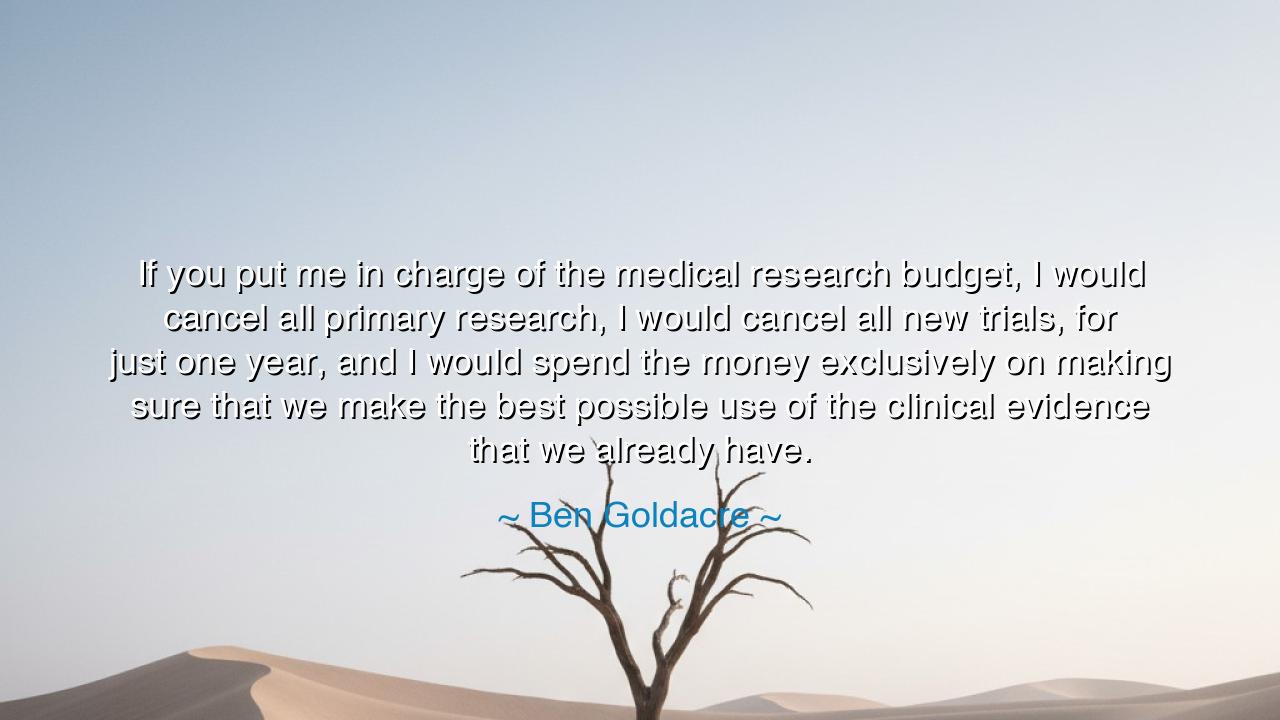
If you put me in charge of the medical research budget, I would
If you put me in charge of the medical research budget, I would cancel all primary research, I would cancel all new trials, for just one year, and I would spend the money exclusively on making sure that we make the best possible use of the clinical evidence that we already have.






The words of Ben Goldacre—“If you put me in charge of the medical research budget, I would cancel all primary research, I would cancel all new trials, for just one year, and I would spend the money exclusively on making sure that we make the best possible use of the clinical evidence that we already have.”—are like a thunderclap against the endless hunger for novelty. In them lies not a rejection of discovery, but a call to wisdom: that before we run headlong toward the new, we must honor, examine, and properly use the treasures already in our hands. For what good is endless research if the evidence it produces is buried, ignored, or misused?
The ancients knew this truth well. They taught that wisdom is not found in the constant chase for fresh knowledge, but in the careful application of truths already known. A farmer may seek exotic seeds, but if he does not cultivate the ones already in his storehouse, his fields will still lie barren. So too with medical research: the world is filled with mountains of data, trials completed, evidence gathered. Yet too often these riches lie in disarray, unstudied, unpublished, or poorly communicated, leaving patients and physicians wandering in uncertainty. Goldacre’s words cry out: let us first master what we have before chasing more.
Consider the story of Ignaz Semmelweis, the physician of the 19th century who discovered that simple handwashing dramatically reduced deaths in maternity wards. The evidence was plain before him: women died when doctors moved from autopsy rooms to birthing chambers without washing their hands, and they lived when cleanliness was enforced. Yet because his discovery was dismissed and neglected, countless lives were lost. The tragedy was not the absence of research, but the failure to heed the clinical evidence already gathered. Goldacre’s vision is born of this same sorrow: the knowledge exists, but until it is properly used, its power is wasted.
There is also a heroic humility in his suggestion. For in a world dazzled by innovation, by the pursuit of new trials and new cures, it takes courage to say: pause. Look at what we already know. In this humility is wisdom, for the truest progress is not always forward—it is also inward, downward, deeper into the soil of understanding. Without such grounding, new discoveries build upon shaky foundations, and the cycle of waste, error, and neglect continues unbroken.
Goldacre’s words are also a warning against arrogance. For too often societies believe that salvation lies in the next discovery, the next miracle drug, the next shining breakthrough. But what if salvation already lies quietly in the evidence we neglect? What if millions could be saved today, not by new research, but by properly applying what has already been proven? His call to action is not anti-science—it is the highest respect for science: the demand that its fruits not be squandered.
The lesson for us is clear: before we hunger for more, let us learn to honor what we already have. In our own lives, this truth holds as well. We seek new wisdom, new solutions, new paths, yet often neglect the lessons already written in our own experiences, in the histories of our people, in the guidance of those who came before. The treasures of yesterday are the foundation of tomorrow.
Practical action is plain: support transparency in research, demand that clinical trials publish their results, and encourage systems that synthesize and apply evidence rather than letting it languish in obscurity. For the ordinary person, this lesson also calls us to pause: before rushing into the new, ask if you are truly making use of the knowledge you already hold. Physicians, policymakers, and citizens alike must remember that wisdom is not accumulation, but application.
So let Goldacre’s words be remembered as a call to discipline and reverence: use what you know, before chasing what you do not. To honor the evidence already gathered is to honor the lives that made it possible, the patients who participated, the doctors who observed, the scientists who labored. If we heed this call, the knowledge of the past will serve the present, and the present will be a foundation strong enough for the future.






AAdministratorAdministrator
Welcome, honored guests. Please leave a comment, we will respond soon